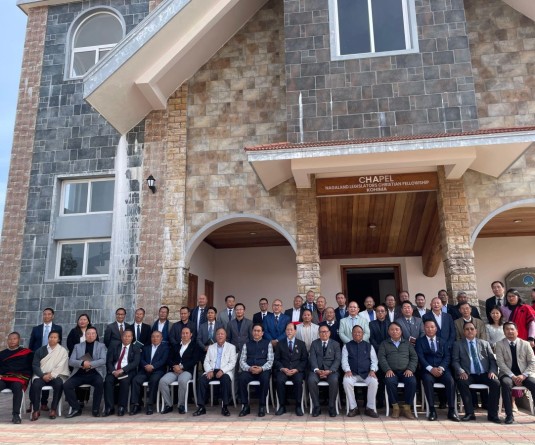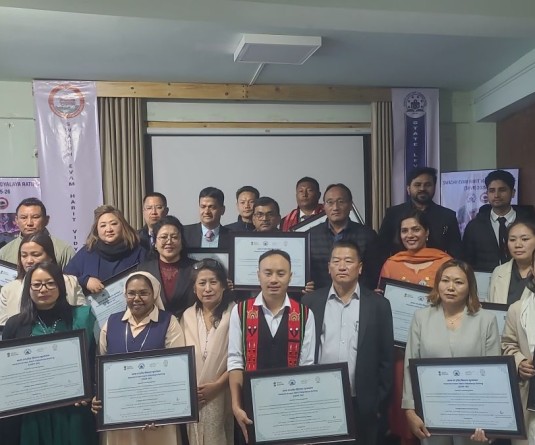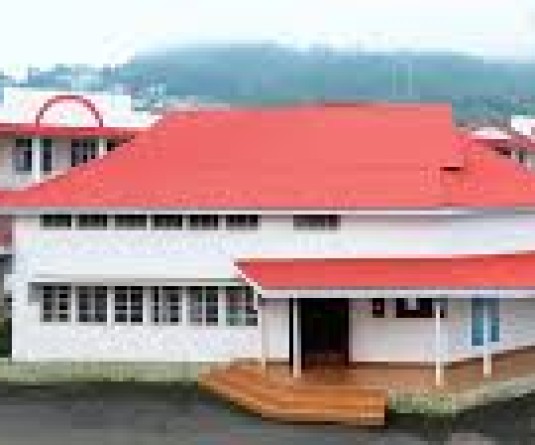Our Correspondent
Kohima | November 9
Nagaland Chief Minister Neiphiu Rio today highlighted the account of the string of events that have led to the drafting of the present Nagaland Municipal Bill, 2023.
The Nagaland Municipal Bill, 2023 was passed at the third session (Emergent session) of the 14th Nagaland Legislative Assembly (NLA) in Kohima on November 9.
Earlier, moving for consideration and passing of Nagaland Municipal Bill, 2023, Rio informed that the 73rd and 74th Constitutional Amendment Acts, 1992, lay the foundations for the establishment of vast networks of local self-governments throughout India. The 73rd Constitution Amendment Act provided for, and laid the foundation for the establishment of three-tier local self-governments in the rural areas, to be known as Panchayati Raj. This act had exempted Nagaland and other tribal areas of North East India from its purview, as we already have our village councils, constituted as per our respective traditional and customary practices.
However, Rio said, the 74th Constitution Amendment Act, 1992, which provided for the establishment of local self-governments in the urban areas, did not give any exemption to Nagaland and other tribal areas of the North East.
“This is most probably due to the fact that in our urban centres, which are of recent origin, we do not have traditional or customary institutions of local self-governments. Thus, being not exempted, we were under obligation to enact laws for the establishment of urban local bodies for our urban areas, in conformity with the Constitutional provisions. Accordingly, the Nagaland Municipal Act, 2001 was enacted. The Act came into force with effect from 20th December, 2002,” Rio said.
As per the provisions of the Nagaland Municipal Act, 2001, the State held its first election to Urban Local Bodies (ULBs) in December 2004. However, the elections for Mokokchung Municipal Council could not be held owing to opposition by the people of Mokokchung on various grounds.
Rio recalled that the Nagaland Municipal Act, 2001 did not make provision for women reservation.
Article 243T, in Part IXA of the Constitution, which was inserted by the 74th Constitutional Amendment Act, 1992 stipulated that a minimum of one-third of the total number of seats to be filled by direct elections in every Municipality shall be reserved for women. The reserved seats are to be allotted by rotation to different constituencies in a Municipality.
Writ Petition filed in High Court
A Writ Petition was, therefore, filed in the High Court in 2005, challenging the absence of the provision for reservation of seats for women in the Nagaland Municipal Act, 2001.
In consonance with the Constitutional provision, the State Assembly subsequently amended the Nagaland Municipal Act, 2001 and inserted Section 23A & 23B vide the Nagaland Municipal (First Amendment) Act, 2006, providing for 33% reservation of seats for women in the ULBs.
Subsequently, in 2008, Mokokchung Municipal Council was selected as the first ULB in the state for holding elections in accordance with the amended act, providing for women reservation. However, elections had to be called off as no candidate came forward to file nomination due to strong opposition by the people of Mokokchung.
Then, in December 2009, notice for conduct of election to the 19 ULBs in Nagaland with women reservation was issued. However, elections were deferred due to receipt of several representations, and due to stiff opposition to provision for reservation of seats for women.
Thereafter, to break the deadlock on the issue of women reservation in the ULBs, a consultative meeting with Tribal Hohos and Civil Societies was held on 18th October 2010 at Kisama. The Urban Development Department further held consultative meetings on the issue of women reservation with Tribal Hohos, Women Organisations and Civil Societies in all District Headquarters during the month of April and May, 2011. However, no consensus could be arrived at on the issue.
Then in June 2011, a Writ Petition was filed in the High Court, challenging the Government’s decision to indefinitely withhold election to the ULBs.
The High Court passed an order directing the State Government to hold ULB elections. Once again, notification was issued in March 2012 for conduct of election to the ULBs with 33% women reservation. However, owing to stiff opposition by various Tribal Hohos and other CSOs, the elections were indefinitely postponed.
Rio said that this Assembly, in September, 2012, then passed a resolution to exempt Nagaland from the application of Article 243 T of Part IX-A of the Constitution, relying on the provision of Article 371 A of the Constitution of India.
Subsequently, a special leave petition against the resolution of the Assembly was filed in the Supreme Court by Joint Action Committee on Women Reservation (JACWR) seeking intervention of the Court for implementation of women reservation in ULBs of Nagaland.
Rio stated that the 12th Nagaland Legislative Assembly, in its 14th Session on November 24, 2016 then passed a resolution revoking the earlier Resolution passed by it under Article-371A of the Constitution that had exempted Nagaland from the application of Part-IXA of the Constitution of India.
Further, to address the concerns regarding taxation issues, an amendment was made to the Nagaland Municipal Act, 2001, removing the provisions pertaining to taxation on lands and buildings.
Then in December 2016, a notification was issued by the State Election Commission for holding of elections to the ULBs on February 1, 2017.
This was followed by wide-spread agitations and bandhs all over the State organised by various Tribal Bodies and CSOs, during which some Government buildings were burned down, and precious lives were also lost. Considering the seriousness of situation, the Government declared the election process to the ULBs as null and void.
In the following years, as the Writ Petition regarding the ULB elections and women reservation continued to be heard in the Supreme Court, the Government made a series of efforts to secure the confidence of all stake holders, and to reach a consensus on the issue.
Supreme Court on February 22, 2022 gave a categorical order directing the State of Nagaland to hold elections to the ULBs within 6 (six) weeks. In view of the Supreme Court’s Order, Rio said “we took urgent initiatives, and held a State level consultative meeting with all the stakeholders, including Tribal Hohos and mass-based organizations, on 9th March 2022.”
Finally, there appeared to be a broad consensus emerging for holding of ULB elections with 33% women reservation. The Supreme Court in its order in July 2022 directed the State Government to complete the ULB election process by January, 2023, and it was decided in a meeting of the Cabinet held on 3rd January 2023to hold elections to the ULBs after the completion of the election process to the 14th NLA.
The Supreme Court, on February 13, 2023, directed the State Government to hold elections to the ULBs at the earliest possible. Accordingly, on March 9, 2023, the State Election Commission issued notification for holding election to the ULBs in Nagaland with the date of poll scheduled on May 16, 2023.
However, Rio said, in view of the continued opposition by tribal bodies and civil society organisations to the holding of ULB election, and also the lingering feeling among a wide cross section of our people that the provisions of the Nagaland Municipal Act, 2001 were in contravention of Article 371 A; the 14th Nagaland Legislative Assembly in its very first session held on the 28th of March, 2023 unanimously resolved to repeal the Nagaland Municipal Act 2001 in toto, and to enact a new Nagaland Municipal Act as expeditiously to govern the Urban Local Bodies which would take into consideration once and for all the grievances of all the interested parties.
The Supreme Court, however, where the matter on ULBs in the State continued to be heard, expressed its strong displeasure expressed to the repealing of the Nagaland Municipal Act 2001, and maintained that the constitutional scheme of having 1/3rd reservation of seats in Municipalities for women, and holding election for the constitution of the urban local bodies can’t be violated. The Supreme Court also stated in clear terms that providing for 1/3rd representation to women do not impinge on Article 371 A in any manner, and that the personal laws of Nagaland and its special status under Article371A(1) of the Constitution were not being touched in any manner by provision for women reservation in ULBs.
On new Nagaland Municipal Bill, 2023
Rio informed that the state government constituted a Committee headed by the ACS & FC, Nagaland to draft a new Municipal Bill and the Committee submitted the draft Municipal Bill to the Government on 25th August 2023.
In the draft new Municipal Bill, the provisions relating to taxes on land and buildings have been excluded.
The provision for 1/3rd reservation of seats in ULBs for women is kept in the bill given the clear directions of the Supreme Court. However, the provisions for 1/3rd reservation of the offices of the chairperson in ULBs for women which was there in the earlier Municipal Act has not been included in the Municipal Bill.
On September 1, 2023, a consultative meeting with our Tribal Bodies and CSO was held, and the salient features of the new Municipal Bill was made known to them.
After deliberations on the issue, the Tribal Bodies conveyed their broad agreement to the draft provisions, including the provision for 1/3rd reservation of seats for women in ULBs.
Rio thanked the tribal bodies and CSOs for their understanding and cooperation on this issue.
Accordingly, in the last session of the Assembly, on 12th September 2023, the Government had tabled the new Nagaland Municipal Bill, 2023; “and this House, in its wisdom, had decided to refer the Bill to a Select Committee of the House for examination.”
The Select Committee, consisting of 7 Members of this House, headed by TR Zeliang, Deputy Chief Minister has examined the Bill; and while agreeing to all the provisions of the Bill; in the interest of the people as well as make the proposed Act even more efficacious, has recommended for incorporation of certain more clauses in the Bill.
“It has been recommended to make only the indigenous inhabitant of the State eligible for becoming a member of any Municipal or Town Council, and also that the Municipal Act should be reviewed periodically after every 10 years, which was also the view of many of our CSOs. In the latest Nagaland Municipal Bill, 2023, which has been introduced today we have incorporated these recommendations of the Select Committee,” the CM said.
He said that the objection to ULB elections unfortunately became a matter concerning our customary practices; “and in this journey we were sandwiched between the voice of the people who elected us and the mandate of the Constitution which has to be complied. Our topmost priority, however, always remained to ensure that our issues are amicably sorted out through peaceful means and without violence. And to a great extent, we have succeeded in our venture. While recounting this difficult journey, let me also mention the debts we owe to the Honourable Judges of the Supreme Court who heard our case and who understood the difficulties we were facing, and played a significant role in guiding us with utmost patience to enable us to reach the present stage wherein the women of Nagaland would be given representation in urban local bodies. For this, we are immensely grateful to the Honourable Judges of the Supreme Court.”
“This law, which we are going to have, is not the end, but only a beginning,” Rio said.
Quoting a famous saying about women “If you want something said, ask a man; if you want something done, ask a woman,” Rio said “Therefore, the time has come for the women folk to participate and perform in the administration of the urban local bodies, and I hope that in a short time, we will see positive and meaningful results.”
“Our state may be a late starter in the process of urbanization. However, the rate of urbanization in Nagaland has been quite rapid of late. We have now 39 urban local bodies across the state. We have to provide this growing urban population the required urban infrastructure and urban amenities through local self-governments. We have lost many precious decades in negotiating for a consensus on the issue of ULBs. With the passage of the new Nagaland Municipal (Bill), 2023, let us hope that the new ULBs would be able to take the required steps to make our cities and towns better administered, more developed, more organized, more clean and more beautiful,” the CM asserted.






